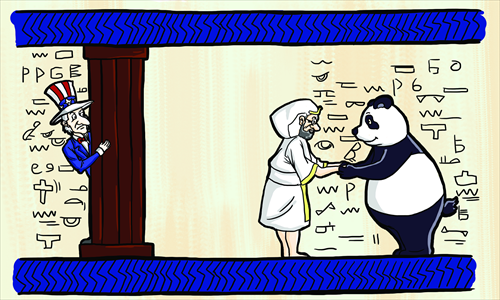Aid no longer buys affection for US on Egypt’s streets

Editor's Note:
New Egyptian President Mohamed Morsi picked China rather than the US for his first visit to a big power, which has caused some stir. The visit, scheduled from August 28 to 30, is intended to bring Sino-Egyptian relations into a new stage. Is Egypt looking east? What does the visit mean to the US? Global Times invited two scholars to share their views.
Morsi starts his visit to China on Tuesday. This diplomatic activity has upset some US observers.
Morsi attended the Islamic Cooperation Summit held in Mecca, Saudi Arabia during August 14 and 15, where he shook hands with Iranian President Mahmoud Ahmadinejad. Now he has chosen visiting China as his first major bilateral diplomatic activity and will attend the Non-Aligned Movement Summit in Teheran on his way back. Some observers argue that these actions mean that the reality of present-day Egypt has contradicted the high US expectations of the Arab Spring.
It's better to understand this from a historical perspective. In 1979, then Egyptian president Anwar el-Sadat signed the Camp David Accords with Israel under US mediation. The US gained the upper hand in strategic competition with the Soviet Union in the Middle East, but of course, paid a price in promoting the peace treaty.
Israel kept receiving the most aid from the US, but Egypt could also receive $2.1 billion every year, becoming the second largest aid recipient from the US. The US assistance to Egypt helped the two countries maintain strategic relations even after Sadat was assassinated in 1981.
However, compared with over 30 years ago, the US influence in Egypt has been shrunk. In the past years, the US aid to Egypt has declined to less than $1.6 billion, not to mention the effects of inflation. But in contrast, the US agreed to make an annual increase of $600 million in its aid to Israel.
Economic assistance only makes up a small slice of the US aid to Egypt. This could hardly benefit the ordinary Egyptians. US economic aid to Egypt was $250 million in 2012, 16 percent of the total. But all the military aid is required to be used in purchasing US military products. Against the backdrop of economic crisis, this aid seemingly is more to support the military industry of the US rather than aid Egypt.
When Egypt purchases US weapons, the precondition for the US is to guarantee the superiority of Israel in weapons. For example, when Egypt was finally allowed to purchase the F-16 fighters from the US, Israel had gained the more advanced F-15 already.
The US has been trying to interfere in Egyptian domestic affairs for many years.
The US has pressed Egyptians to establish a Western-style democratic system since the outbreak of the Arab Spring. But when Morsi, who doesn't favor the US, was elected as the new president through legal procedures, the US expressed strong disappointment and suspicion, which aroused dissatisfaction of the Egyptian public.
We cannot say that US aid to Egypt has lost its influence, but one certain thing is that it cannot make the new Egyptian government follow the US lead in domestic and foreign policies any more.
For a long time, China has been providing assistance to Egypt within its ability. Although it's less than the US provides, China's assistance has more practical effects in helping Egypt. More importantly, China respects Egypt's choice of political system, and there are definitely no political associations with economic assistance.
During Morsi's visit, the two countries will exchange ideas on bilateral relations and relevant international issues. And they will sign a series of bilateral cooperative agreements.
One of the challenges of the new Egyptian government is to develop the economy and improve people's livelihood. Under such conditions, expanding trade with China and enhancing economic cooperation, especially attracting more Chinese investment to boost employment have practical and significant meanings. China's experiences in alleviating poverty and developing economy could also help Egypt. That's why Morsi chose China for his first trip.
The author is a professor at the Institute of International Studies at China Foreign Affairs University. opinion@globaltimes.com.cn